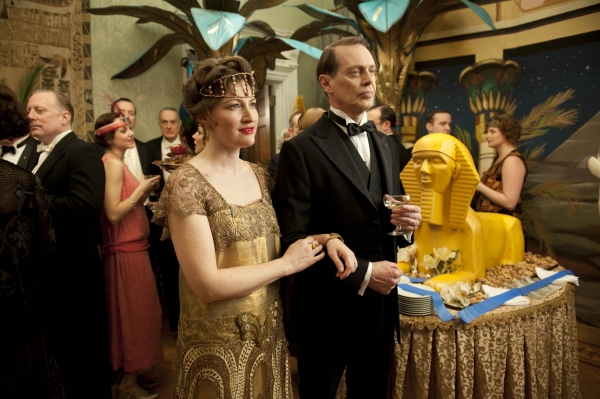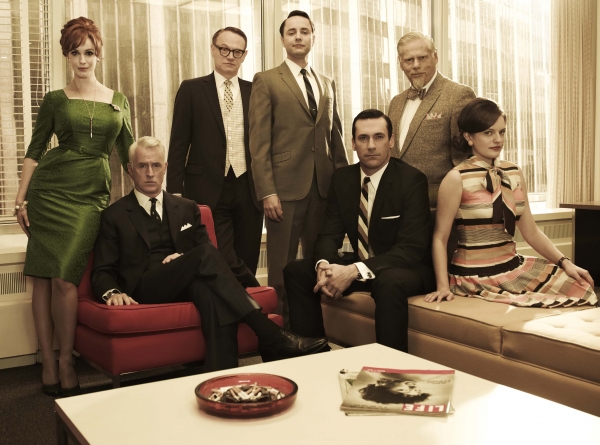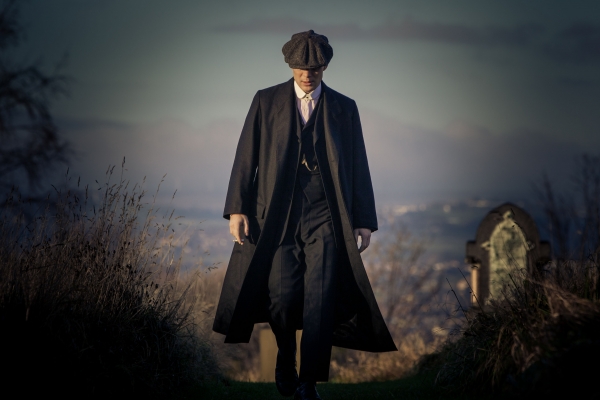movieScope: The Appeal of the Small Screen
This article is taken from edition 36 of Moviescope magazine.
The Appeal of the Small Screen

With an increasing number of big-screen talent migrating to television projects, some of film’s A-list—including Ron Howard, Jane Campion and Cillian Murphy—tell us just why the small screen is proving so intoxicating… Text: James Mottram
Peter Mullan is recalling a recent trip to Los Angeles. The actor/director arrived in the heart of Hollywood to pitch his latest idea: a film about Hurricane Katrina. As he surveyed the scene on Sunset Boulevard, he was struck by the sight of the massive billboards that dwarf the skyline. “Everywhere I looked, it was all HBO, big TV shows, new shows I’d never heard of,” he says. “I asked a mate of mine who lived in LA, and she said, ‘Yeah, it’s all we ever see—TV posters.’ And this is Hollywood, the heart of the so-called Mecca of film.”
In some respects, this shouldn’t be a surprise. The past decade has seen cable television outfits like HBO and AMC deliver some era-defining shows; The Sopranos, The Wire, Game of Thrones, Mad Men, Breaking Bad—dramas that have sold worldwide and re-defined the way we think about television narrative. “I’m watching TV again,” admits director Ron Howard, whose career has spanned both mediums. “I had more or less stopped watching television for about 20 years.”
If the 1970s were regarded as a golden age for Hollywood—when the likes of Martin Scorsese and Francis Ford Coppola were in their pomp—television has now reached a new pinnacle. “More and more, television is very, very provocative and risky. People are letting their imaginations run wild on TV,” says Holly Hunter, the Oscar-winner who switched to the small screen to produce and star in crime show Saving Grace. “On cable, there’s very little restriction. People can really express themselves. It’s a big, big shift.”
With Hollywood studios becoming increasingly risk-averse as they push all their chips onto blockbuster franchises designed to appeal to the widest demographic possible, Hunter has seen what she calls a “lessening of great feature films” produced in the US system. Much of this is down to budgets—which are either less than $5m or over $100m. “Everything in-between is kinda gone,” she observes. “They’re not making movies for $30m, unless Tom Cruise or Scarlett Johansson stars. It’s a shrunken market, financially.”
Hunter is not the only one predicting this implosion. Earlier this year, at an event held to mark the opening of the USC School of Cinematic Arts, Steven Spielberg and George Lucas were all doom and gloom. Referring to Spielberg’s Lincoln and the movie he produced, Red Tails, Lucas noted: “We barely got them into theatres. You’re talking about Steven Spielberg and George Lucas can’t get their movie into a theatre.” Predictions from the pair included ‘event’ movies in the future following the Broadway / West End model—staying in theatres for a year and costing upwards of $25 a ticket.
As a result, with cinema in such a state of creative flux, directors and stars have flocked to the small screen. Think of Michael Mann, who executive-produced horse-racing drama Luck, starring Dustin Hoffman; Martin Scorsese, who similarly oversaw the 1920s mob story Boardwalk Empire, as well as directing the first episode; David Fincher turned to video-on-demand site Netflix for his remake of political show House of Cards, featuring Kevin Spacey; and Todd Haynes went to HBO to direct his Golden Globe and Emmy-winning Mildred Pierce, starring Guy Pearce and Kate Winslet.

In truth, these veteran directors have not left cinema, but rather detoured into television. Scorsese and Mann are putting the finishing touches to The Wolf on Wall Street and Cyber respectively, while Fincher is in pre-production on Gone Girl and Haynes is cranking up his next movie, Carol. Yet lesser-known filmmakers are now making their living crafting episodic television. Look at Season 2 of Showtime’s ultra-popular terrorist drama Homeland, which featured episodes directed by such indie stalwarts as Lodge Kerrigan (Keane), John Dahl (The Last Seduction) and Jeremy Podeswa (The Five Senses).
It’s not just in the US, either. This year, The Piano’s Jane Campion has seen her Twin Peaks like mystery-drama Top of the Lake—an Australia-UK co-production, starring both Peter Mullan and Holly Hunter—win critical acclaim. “It’s quite obvious that cinema is limping along,” says Campion, who initially decided to veer towards television because she was sick of all the publicity that goes with promoting a film. “I thought with TV they’d just put it on, and that would be that! And you do have to sell it less. That was a big reason.”
Personal reasons aside, Campion realised that the best way to access her audience was via television. “I don’t think my audience goes to the movies any more. They don’t like the big movies—maybe they’ll go and see Skyfall or The Bourne Identity but they’re looking for more interesting material and they’re starting to see it on TV or they get the DVDs and watch it at home. And they’ve got kids and it’s hard to for them to get out.”
Indeed, the consumption of modern-day entertainment has dramatically swung in favour of television. The idea of spending a weekend on the sofa binge-viewing a DVD box-set is a relatively new one, as is working your way through a series that your digital video recorder has dutifully recorded for you, but in a society that demands instant access, these methods—along with streaming sites like Netflix—provide the perfect viewing platforms. All of a sudden, taking a trip to your local fleapit seems like a very outdated concept.
Howard estimates 24—which Imagine Entertainment, the company he and Brian Grazer formed in 1986, was behind—was one of the first shows to exploit this, with its serialised ‘hourly’ episodes. “We got lucky. That experiment had been tried a couple of times before but people were reluctant to engage because if they dropped an episode it would be frustrating. Well, DVDs came along and that was even before downloading and DVRs. It enabled people to binge-view 24, and it built a fan base and a following that was cool and allowed the storytellers to delve into the characters more.”
Aside from the obvious financial advantages that being tied to a recurring series can bring, this is exactly why television is appealing for any actor. “To try and explore a character over six hours is not something I’d ever had the opportunity do before,” says Irish star Cillian Murphy, who can currently be seen in the Steven Knight created BBC series Peaky Blinders, a 1920s gangster drama that looks to do for Birmingham what Boardwalk Empire did for Atlantic City.

Murphy, best known for his work in films like 28 Days Later and Batman Begins, hadn’t worked in television for a dozen years, since 2001’s mini-series The Way We Live Now. But, he says, it wasn’t for any reasons of snobbery. “I didn’t get sent the scripts [for] any television. So I went off and made films and did theatre. In those 12 years, the amount of writers and directors who are migrating to telly has increased hugely and I think the quality has increased hugely.”
You only have to look at The Wire to see the sort of writers recruited; esteemed crime novelists like Richard Price, George Pelecanos and Dennis Lehane all took on scripting duties. Game of Throneswas co-created by David Benioff, who previously scripted Spike Lee’s25th Hour, Troy and X-Men Origins: Wolverine. Meanwhile, AMC has just announced that for the forthcoming final season of Mad Men, Chinatown’s Oscar-winning scribe Robert Towne will be coming on board.
Then there’s the channels themselves. “What’s interesting is that it’s no longer HBO as the prestige channel on cable,” says Haynes. He points out that AMC used to be a movie channel with commercials, then produced Mad Men. “It’s become a competitor to HBO…it’s just created a more competitive playing field, and that usually produces diversity, because there are more people trying to get their foot in. Now, anybody could become the next AMC with a hit show that is unique.”
With increased budgets, first-rate crews and bigger scope, the lines have blurred like never before. It’s why various television shows are now being screened at film festivals. Mildred Pierce took its bow at Venice; Top of the Lake went from Sundance to Berlin; and Peaky Blinders saw its first two episodes play out at the Edinburgh International Film Festival. Indeed, ironically, a big-screen cinema is almost the perfect place to watch a show that’s as cinematic as Peaky Blinders.
Yet with modern audiences watching product on phones, tablets and laptops as well as televisions, those barriers between mediums have now come crashing down. What does seem clear is that just as actors are craving the chance to delve further into characters, so audiences want narratives more complex than a two-hour film can deliver. “A lot of people talk about The Wire being like a televisual novel, and I can understand that,” says Murphy. “Once you start, you go into such detail, and you keep wanting to get to the next chapter.”
Quite whether ‘cinema is dead’, to quote director Peter Greenaway, is another matter. Having previously fought off the arrival of television, it’s proved its durability over the decades. And after all, nobody is saying that film is longer a valid medium, just that it is an alternative source of storytelling in a world that’s increasingly diverse. “It’s a whole other thing,” says Hunter. “It’s the difference between reading a great short story by Raymond Carver and reading Moby Dick. Carver is no less of an artist than Herman Melville.”
This article is taken from edition 36 of Moviescope magazine.
